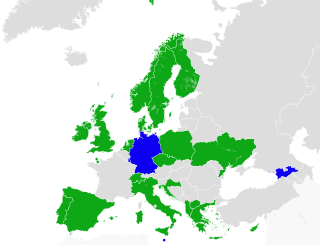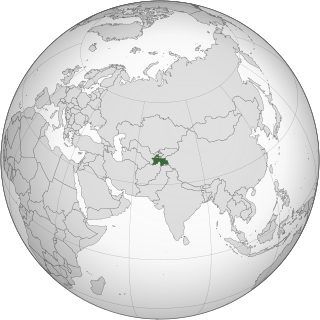Related Research Articles

Cannabis, commonly known as marijuana, weed, and pot, among other names, is a non-chemically uniform drug from the cannabis plant. Native to Central or South Asia, the cannabis plant has been used as a drug for both recreational and entheogenic purposes and in various traditional medicines for centuries. Tetrahydrocannabinol (THC) is the main psychoactive component of cannabis, which is one of the 483 known compounds in the plant, including at least 65 other cannabinoids, such as cannabidiol (CBD). Cannabis can be used by smoking, vaporizing, within food, or as an extract.
A drug policy is the policy regarding the control and regulation of psychoactive substances, particularly those that are addictive or cause physical and mental dependence. While drug policies are generally implemented by governments, entities at all levels may have specific policies related to drugs.

Cannabis in California has been legal for medical use since 1996, and for recreational use since late 2016. The state of California has been at the forefront of efforts to liberalize cannabis laws in the United States, beginning in 1972 with the nation's first ballot initiative attempting to legalize cannabis. Although it was unsuccessful, California would later become the first state to legalize medical cannabis through the Compassionate Use Act of 1996, which passed with 56% voter approval. In November 2016, California voters approved the Adult Use of Marijuana Act with 57% of the vote, which legalized the recreational use of cannabis.

Cannabis is legal in Uruguay, and is one of the most widely used drugs in the nation.

Cannabis in Papua New Guinea is illegal, but the nation is a significant producer and consumer of cannabis. Cannabis is sometimes called spak brus in local parlance.

Cannabis in Jamaica is illegal, but possession of small amounts was reduced to a petty offence in 2015. Cannabis is locally known as ganja, and internationally cannabis consumption plays a prominent role in the nation's public image, being tied to cultural touchstones such as Rastafari and reggae music. Ganja tourists have been welcomed in the 21st century.

Cannabis in Chile is illegal for all production and public consumption, though private at-home consumption, grow and selling is allowed for medical use. It is widely consumed, with the highest per-capita use in Latin America. In 2014 Chile began clinical trials on medical marijuana, and in 2015 a decriminalization bill successfully passed the lower house of the Chilean Congress.

Cannabis is illegal in Nigeria, yet the country is a major source of West African-grown cannabis, and ranked the world's third highest consumer of cannabis.
Cannabis in Guyana is illegal for all uses, but is both grown and consumed in the nation. Possession of 15 grams or over can result in charges of drug trafficking.

Cannabis in Washington relates to a number of legislative, legal, and cultural events surrounding the use of cannabis. On December 6, 2012, Washington became the first U.S. state to legalize recreational use of marijuana and the first to allow recreational marijuana sales, alongside Colorado. The state had previously legalized medical marijuana in 1998. Under state law, cannabis is legal for medical purposes and for any purpose by adults over 21.

Cannabis is one of the most popular controlled substances for cultivation and consumption within the country of Belgium. Following global trends, cannabis consumption rates in Belgium have been steadily increasing across the country since the 20th century, and cannabis cultivation continues to expand rapidly on a national scale. Despite significant legal rework of cannabis-related laws since 2010, certain elements of the consumption and cultivation of cannabis are considered to exist within a “legal grey area” of Belgian law. Cannabis is technically illegal in Belgium, but personal possession has been decriminalised since 2003; adults over the age of 18 are allowed to possess up to 3 grams. The legal effort to restrict cultivation and growth has gradually subsided, resulting in an increase of the growth and consumption of cannabis and cannabis-related products.

Cannabis in Cambodia is illegal. This prohibition is enforced opportunistically. Many "Happy" restaurants located in Phnom Penh, Siem Reap and Sihanoukville publicly offer food cooked with marijuana, or as a side garnish.

Cannabis has been cultivated in Japan since the Jōmon period of Japanese prehistory approximately six to ten thousand years ago. As one of the earliest cultivated plants in Japan, cannabis hemp was an important source of plant fiber used to produce clothing, cordage, and items for Shinto rituals, among numerous other uses. Hemp remained ubiquitous for its fabric and as a foodstuff for much of Japanese history, before cotton emerged as the country's primary fiber crop amid industrialization during the Meiji period. Following the conclusion of the Second World War and subsequent occupation of Japan, a prohibition on cannabis possession and production was enacted with the passing of the Cannabis Control Law.

Cannabis in Syria is illegal. Under the policies of the Syrian Arab Republic cannabis was illegal and punishable by up to 20 years in prison in large drug trafficking offenses, if someone is considered an addict by the Syrian government then they face no criminal penalties for drug use and possession. Since the start of the Syrian civil war cannabis laws had become widely unenforced by the Syrian government as well as Kurdish and rebel controlled territories, while civilians growing cannabis in Jabhat al-Nusra controlled territory face arrest. On multiple occasions Bashar al-Assad granted general amnesties to multiple crimes which included drug trafficking offenses.
The list includes and details significant events that occurred in the global history of national-level implementations of, or changes made to, laws surrounding the use, sale, or production of the psychoactive drug cannabis.
Cannabis in Suriname is illegal. Cannabis is the most popular illegal drug in Suriname.
Cannabis in Lesotho is a traditional crop that remains illegal for any use, but largely tolerated. The plant is known as matekoane in Sesotho language but also called khomo ea fatše, likata or kakana.
Cannabis in Montserrat, the British Overseas Territory in the Caribbean Leeward Islands, is illegal under British law.
Cannabis in Saint Vincent and the Grenadines was prior known to be illegal but is now decriminalized up to 2 ounces. Persons caught with 56 grammes or less of the drug will not be subject to incarceration. Instead, they will be fined a maximum of $500 and be subject to other measures including begin given educational material about cannabis; counselling and rehabilitative care. These provisions were among several amendments that were made to the Drugs Amendment Act (2018), which was passed in Parliament on July 25. In addition to only being a ticketable offense, the amendment provides for Vincentians to smoke the herb in the privacy of their homes and in places of worship of the Rastafarian faith without punishment. The amendment also said that the Minister may designate a list of public areas where the smoking of cannabis may be allowed. The country has correlating legal medical marijuana laws. Parliament on December 11, 2018, passed two Acts, one which establishes a Medical Cannabis Industry in St Vincent and the Grenadines and the other which offers amnesty for traditional marijuana growers. The Vincentian Parliament passed legislation to protect the intellectual property of breeders of new plant varieties in St. Vincent and the Grenadines (SVG), the Plant Breeders’ Protection Bill, 2019. It sets up the jurisprudential framework within which these persons will be able to accrue the rights, how these rights will be protected, how they will be published so that persons in the entire society, in the court and globally, can be aware of the hard work which was done, the agriculture minister said. Under the law, a person must obtain the authorization of a grantee with respect to propagating material of the protected variety, to produce or reproduce, condition the material for the purpose of propagation, offer the material for sale, to sell the material, import or export the material, or stock the material for any of the previous purposes. Regarding infringement of plant breeders’ rights, the following acts are exempt: an act done privately for non-commercial purposes, an act done for experimental purposes, or an act done for the purpose of breeding other plant varieties. The law allows for compulsory licenses where a person may apply to the court for the grant of a compulsory license to exploit a protected variety in SVG. Subject to terms that the court thinks fit, the court may make an order for the grant of compulsory licenses if it is satisfied that the grant of the compulsory licenses is in the public interest. Offense under the law include falsification of register and falsely representing a plant variety as a protected variety. The law also orders the registrar to publish applications for plant breeders’ rights, proposed and approved denominations, withdrawals of application for plant breeders’ rights, the rejection of applications for plant breeders’ rights, any grant of a breeders’ right, any change in the breeder or the agent in respect of a plant variety, lapses of plant breeders’ rights, any invalidation or revocation of a plant breeder's rights, the licenses in relation to plant breeders’ rights, where applicable. Cannabis is widely grown illicitly on the island and is the nation's most valuable agricultural product. Saint Vincent is the most prolific producer of cannabis in the Caribbean, other than Jamaica.

Cannabis in Tajikistan is illegal with severe penalties for the production, sale, and possession of marijuana for medicinal or recreational purposes. Punishments include up to five years in prison for possession and capital punishment or 25-year sentence for sale.
References
- 1 2 Graeme R. Newman (19 October 2010). Crime and Punishment around the World [4 volumes]: [Four Volumes]. ABC-CLIO. p. 65. ISBN 978-0-313-35134-1.
- ↑ United Nations Office on Drugs and Crime (1 June 2010). World Drug Report 2010. United Nations Publications. pp. 197–. ISBN 978-92-1-148256-0.[ permanent dead link ]
- ↑ "BDM Interview with Wilbur Adams" (PDF). Big Drum Nation. May 2010. Archived from the original on 3 July 2021. Retrieved 18 April 2017.
{{cite web}}: CS1 maint: unfit URL (link) - ↑ Ansley Hamid (1998). Drugs in America: Sociology, Economics, and Politics. Jones & Bartlett Learning. pp. 162–. ISBN 978-0-8342-1060-8.
- ↑ Beverley A. Steele (2003). Grenada: a history of its people. Macmillan Caribbean. pp. 398–399. ISBN 978-0-333-93053-3.
- ↑ William R. Brownfield (1 May 2011). International Narcotics Control Strategy Report: Volume I: Drug and Chemical Control. DIANE Publishing. pp. 252–. ISBN 978-1-4379-8272-5.
- ↑ "Grenada has no interest in legalizing marijuana". Caribbean360. 2014-01-24. Retrieved 2016-12-08.